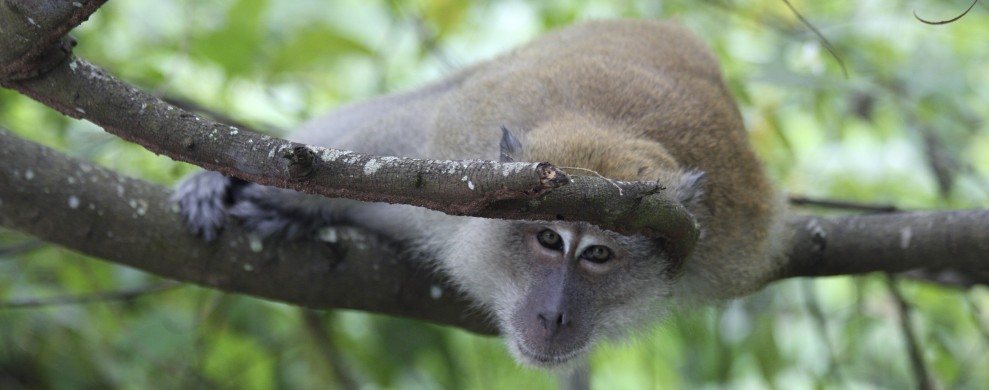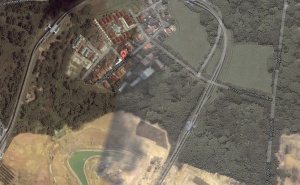Over the weekend Louis Ng, Dr Uma (both from ACRES) and I attended to macaque related calls from residents of Punggol 17th Avenue.
I was apprehensive about trying to reason with these residents, i’ve had my fair share of unreasonable Bukit Timah residents, and these Punggol residents aren’t even those who chose to live near a nature reserve. I prepared myself for the worst, but it turned out more pleasant than expected…
On Saturday, ACRES officers who were manning the AVA hotline, picked up a call from a resident who had managed to capture a baby monkey in the trap loaned to him by AVA. He was unable to get from his car to his house because the baby’s group was surrounding and fiercely guarding the screaming baby.
Louis and Uma rushed down to the scene. After much reluctance on the resident’s part, they managed to negotiate for the release of the baby by telling the resident that this kind of trapping won’t solve the conflict issues, and promising that we would be back the next day to find out more about the neighbourhood’s monkey issues and work towards an effective long-term solution.
I heard the release was epic. The monkeys were frantic as Louis approached the trap, but as soon as he opened the trap, the baby’s mum rushed down and plucked him up and the whole group ran back into the forest.
True to their promise, we returned to Punggol 17th early the next morning. Monkeys were not around and residents were at morning mass, so we explored the neighbourhood and the forested knoll that surrounded it. In the knoll we found the macaques, as well as many species of birds (bee eaters, dollar birds, fish eagles and king fishers), and wild boar with piglets!
Around the neighbourhood, we immediately noticed many fruit trees cultivated by residents – jackfruit, mango, and papaya. The jackfruit trees were fruiting, and there was evidence on the road of a huge jackfruit that the monkeys had consumed the previous night. There was also no form of monkey proofing on the neighbourhood’s bins.
Residents returned from mass and we spoke to some of them. They were very hospitable, welcoming us into their houses, offering us drinks, and sitting down to talk with us at length.
The first family we spoke to had lived there for 18 years, and told us that although they had always seen monkeys occasionally, the visits had become more frequent in the past 2 years, coinciding with the clearing of part of the forested knoll for development (the forest has probably halved since Google photographed it for the picture above).
They griped about how they liked monkeys but not the nuisance problems, did not know how to solve the nuisances, and were not getting help from government agencies. They had called NEA to clear up the mess made by the monkeys’ foraging in the non-monkey proofed bins, but NEA referred them to AVA, and AVA lent them monkey traps which they had to deploy and monitor in their own homes.
They introduced us to Mr Tan from down the road, the vice-chair of their Neighbourhood Committee. When we told him of the previous day’s events, his eyes widened and he said, “of course you have to release the baby!”. When we expressed that spot trapping would not solve the issues he said, “no no no, of course not.”
He expressed that he felt sorry for the monkeys, as they now have to forage for food in the neighbourhood because the forested knoll had been reduced. We told him that it was now even more important to make sure human foods and fruits were not available to them, as these high calorie foods would artificially inflate the monkeys’ population growth, and it was best to let the limited food availability in the forest control the group size, in order to avoid more serious conflict problems.
We were surprised to find out from Mr Tan that the residents were actively campaigning for the government to preserve their neighbouring forested knoll that was slated for development! Hopefully they will succeed, or the Punggol monkeys will be wiped out anyway.
Mr Tan asked why trapping would not solve conflict, and as I listed the academic reasons (that monkeys will learn to avoid traps, that trapping usually only gets the babies, and that they will keep coming as long as human food is made easily available to them), he interjected with the moral reason, that “in the first place these are animals, how can we kill them? they all have the right to live.”
We left with the promise that we would be in touch with their MP to get them monkey-proofed bins, and meet with all the residents at the next NC meeting to discuss replacing the fruit trees with non-fruiting species.
I left Punggol feeling quite moved by their rare “Kampong spirit”, their sense of community, proud ownership of their neighbourhood, and their desire to preserve nature and wildlife, even though they are far from designated “nature reserves”.
However…
Today we got an angry text from the resident who had trapped the baby monkey, saying that the monkeys were back, and we were a joke (despite not having implemented any of our suggestions and given them time to work). Change takes time…

